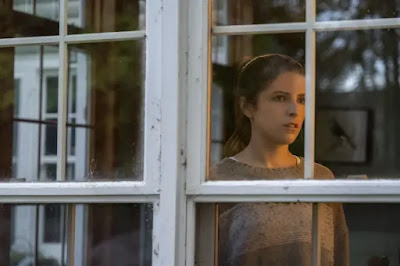Saint Omer (c) Super
Film: Saint Omer
In Cinemas
There’s much to admire in Alice Diop’s “Saint Omer,” a fictional story about a writer covering the trial of a murder case, based on one that actually took place in the titled French city in 2013, making headlines all over the country. In the film version, the woman on trial for killing her 15-month-old daughter is Laurence Coly (Guslagie Malanda), an immigrant from Senegal and a student. The writer from Paris is Rama (Kayije Kagame), also of Senegalese descent, whose newest novel (in the screenplay’s one awkward juxtaposition) is tentatively titled “Medea Castaway,” which is why the murder case interests her so. The majority of the film is the trial, which may seem dry at first, but it’s immensely fascinating because of the case itself (Diop supposedly adapted a lot of the dialogue from court transcripts of the real trial) and how the French court system differs from our own. As much as Diop tries to make Rama interesting (adding maybe one too many similarities between her life and Laurence’s), it is the luridness of the trial that gives the movie its power. Malanda keeps Laurence’s performance at an even keel, even when talking about the night of the alleged murder, her tenuous relationship with her parents and the most fascinating relationship in her life, what she has with her daughter’s father, the much older and already married Luc (Xavier Maley). Diop is a much-lauded documentary filmmaker, and her first narrative film feels very much like one. Her camera is unobtrusive, but always in need to hopefully find the truth just by being on. However, truth is an elusive thing, and this film may frustrate many looking for more easy answers. “Saint Omer” is never easy but hard to look away from.
The Son (c) Sony Pictures Classics
Film: The Son
In Cinemas
I have seen all three of writer Florian Zeller’s Family Trilogy in one form or another. I saw both the Broadway version and Oscar-winning film adaptation of “The Father” and was impressed and frustrated with the technique of disorienting the audience along with the title character, as his dementia slowly dissolves his life away. “The Mother,” which I saw off-Broadway with the extraordinary Isabelle Huppert as the titled character, focuses on her descent as she drinks and self-medicates in order to deal with a cheating husband and indifferent son. It didn’t really stand out, except for a juicy role for Huppert. Now comes the film version of “The Son,” which, despite some moving moments by Hugh Jackman, feels very ordinary and unengaging. The problem is that Peter is not the son of the title, despite a one-note, one-scene cameo by Anthony Hopkins as Peter’s toxic father. Peter is mainly seen as the father of Nicholas (Zen McGrath), a 17-year-old New York City high schooler living with Peter’s ex-wife, Kate (Laura Dern). Kate tells Peter that Nicholas has been cutting school and fighting with her. Despite the fact that his current wife Beth (Vanessa Kirby) has just given birth to, yes, another son, Peter agrees to let Nicholas live with him. Unfortunately, Peter is a workaholic businessman, whose life might get busier as he's expected work on a D.C. political campaign, not realizing that Nicholas may need more attention and hard love decisions on his part. Nicholas is a cypher throughout, feeling at some moments to be a spoiled brat and at others a wounded soul in need of some serious attention. Unfortunately, there is absolutely no surprise where this story goes, down to the climactic moment which involves a theatrical technique that would be a spoiler if I mentioned it. Needless to say, the actors try their best to breathe life into characters who speak as if they’re in a Pinter play rather than real people.
Alice, Darling (c) Lionsgate
Film: Alice, Darling
In Cinemas
I am not the kind of moviegoer who needs things spelled out for me about the plot or character motivation of a film, but "Alice, Darling" director Mary Nighy and writer Alanna Francis hold back the real reason Alice (Anna Kendrick) seems to be making herself sick in relation to her boyfriend for such a long time that, for a while there, I thought he may not be really real. But he is real, and he’s an up-and-coming artist named Simon (Charlie Carrick), and even though we see him being pathologically needy, is he actually being abusive to Alice or is it just her own insecurities manifesting itself into neurotic tendencies? The real real problem is the script, with its minimalist and portentous dialogue when no nonsense realistic talk would have been so much more effective. But alas, then there would be no movie. So, during a birthday weekend getaway with her girlfriends Sophia (Wunmi Mosaku) and Tess (Kaniehtiio Horn), instead of staging an intervention right away, we get half-spoken truths, half-hearted confrontations and totally frustrating diversions, including the search for a missing girl in the town they’re staying in. Only in the last half hour does the truth of Alice’s alternate universe existence come out (if you have a character named Alice, she will eventually go down a rabbit hole) and we finally get some much-needed drama – and it’s a doozy. Kendrick is committed to this role, and only on a second watch (if you’re that sadistic) when you know her situation, do you see what a nuanced and heartbreaking performance she’s giving. Kendrick has said in interviews that she feels very strongly about the film’s themes (she is also an executive producer), but maybe if the film confronted the issue sooner instead of being so coy, it would make for a more impactful journey.
If you want to comment on these reviews, please do so on my Instagram account. All reviews have their own post. And please follow to know when new reviews are released.


